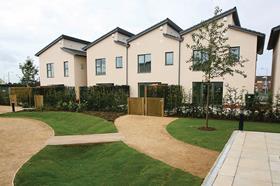Housebuilders say government’s proposal to introduce minimum standards will affect the number of homes built

The government has ignited a fierce debate over the potential introduction of minimum space standards for new homes, with housebuilders warning it will have a big impact on the number of homes built.
The government raised the prospect of minimum space standards for all new homes in a consultation this week following its housing standards review, but the proposal was greeted with resistance from housebuilders.
In addition to space standards, the consultation set out proposals on simplified standards around energy, water usage, accessibility and a raft of other issues (see box below).
But the issue of space standards provoked the strongest debate.
Minimum standards will make sites less viable or housing less affordable
John Slaughter, HBF
The consultation said the government was considering introducing minimum national space standards, but had not yet decided to implement the policy, noting the government’s preference for voluntary, market-based mechanisms.
The consultation said the national space standard could be accompanied by a standardised national space labelling scheme, which would require housebuilders to set out how big homes are when they are sold, to ensure home-buyers can make genuine choices.
Minimum space standards have already been introduced in London by mayor Boris Johnson, with advocates claiming there has been little impact upon build rates.
But John Slaughter, director of external affairs at the Home Builders’ Federation, said the body was totally opposed to minimum space standards, and that introducing them would “undoubtedly” lead to a reduction in housing construction.
He said: “We have argued strongly that minimum standards will either make sites less viable or make housing less affordable.
“It’s just not a thought-through proposition and would be a real mistake in dealing with the housing supply problems we have.
“The risk is it would undermine choice of new homes for those making a choice between the amount of space they have and what they can afford.”
However, the RIBA called for the government to go further by adopting a higher standard than that identified in the consultation as the minimum. Stephen Hodder, RIBA president elect, said: “This consultation is a significant step towards giving people the homes they want and putting right the wrongs of the last three decades.”
Key points from housing standards review
- The possible introduction of a national minimum space standard for new build homes which would accompany a new standardised national space labelling scheme, developed with the industry
- Plans to “wind down” the Code for Sustainable Homes, which sets out environmental targets beyond �ڶ����� Regulations for new homes
- Plans to abolish so-called “Merton rule” planning policies, which have allowed local councils to adopt higher energy-efficiency standards
- Plans to allow higher standards for water efficiency only in areas of verifiable water shortage
- Plans to set out “nationally described” standards covering all these issues, which councils will be allowed to adopt, with the intention these standards will become part of �ڶ����� Regulations
Expert views: Housing standards review
David Bownass, sustainability director at consultant WSP

The government continues to water down regulation with its attempt to scrap the Code for Sustainable Homes following its minimal changes and delayed start to Part L. It would be difficult to justify this as red tape inhibiting development when housebuilder share prices have surged and mortgage support is fuelling a strong recovery. Before abandoning this route to sustainable housing it would be useful to understand the government’s alternative vision to tackle this aspect of the climate change - currently it appears to be “nothing”.
Andy von Bradsky, chair of PRP Architects

Consolidation of all these standards into a simple framework is a definite step in the right direction. Ideally, the government ought to put all of this into �ڶ����� Regulations without ambiguity, to create a level playing field, but the alternative proposed [of nationally described standards] is the next best thing.
Dan Jestico, head of research and development at consultant Hilson Moran

Broadly speaking I think there’s a need for rationalisation. It’s right to keep energy targets in the remit of building control inspectors, which these changes will do. With planning you have a number of people to reach an objective opinion [on a scheme]. With a definable metric like energy it’s a question of compliance or non-compliance so
why are planners expecting to see energy targets?























1 Readers' comment